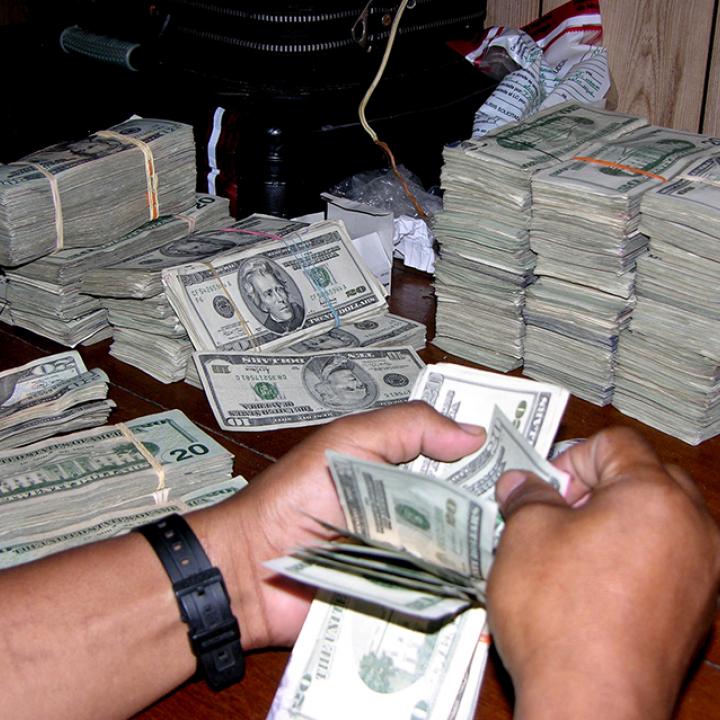
- Policy Analysis
- Interviews and Presentations
Hezbollah's Criminal Network Expanding in Size, Scope and Savvy

In late April, the Obama administration blacklisted two Lebanese money exchanges for allegedly facilitating Hezbollah's use of narcotics trafficking profits to fund terrorist activities. In an email interview, Matthew Levitt, director of the Stein Program on Counterterrorism and Intelligence at The Washington Institute and author of the forthcoming Hezbollah: The Global Footprint of Lebanon's Party of God, explained the broad range of Hezbollah's illicit activities and the growing savvy of its criminal network.
What are Hezbollah's main illicit business activities, and where is it most active?
Hezbollah is engaged in an amazingly broad array of illicit activities, from counterfeiting currencies, documents and goods to credit card fraud, money laundering, arms smuggling and narcotics trafficking. Hezbollah, one investigator quipped, is like the "Gambinos on steroids." In 2002, Hezbollah operatives in North Carolina were convicted for smuggling cigarettes across state lines and sending some of their profits back to their commanders in Lebanon. In 2009, 10 individuals in Philadelphia were charged with conspiring to provide material support for Hezbollah through trafficking stolen laptop computers, passports, Sony PlayStation 2 systems and automobiles. In October 2011, a group of businessmen pled guilty to attempting to ship electronics to a shopping center in South America that the U.S. Treasury Department had designated as a Hezbollah front.
Authorities have tracked similar illicit activities to places as disparate as Benin and Venezuela, in addition to the United States. An extensive 2011 Drug Enforcement Agency investigation traced $200 million a month from cocaine sales in Europe and the Middle East to Hezbollah-linked operations located in Colombia, Lebanon, Panama and West Africa. However, most of Hezbollah's illicit operations take place in the loosely regulated triborder area where Argentina, Brazil and Paraguay meet. Ties between Hezbollah and drug cartels along the U.S.-Mexico border have also grown in recent years.
How important are those businesses as a source of funding for the group?
Hezbollah's criminal network has grown in size, scope and savvy. Wary of the instability plaguing its patrons in Tehran since the Green Movement uprising in 2009, Hezbollah has expanded its illicit activities to gain greater financial independence -- an expansion that is sure to continue in the wake of the uprising in Syria, Hezbollah's other major benefactor. The organization has developed a sophisticated, organized and global crime network that brings in tens of millions of dollars in profit each year. The organization views its illicit income as critical for providing social services to an expanding swath of the Lebanese electorate, paying the families of its fighters and investing in its growing arsenal of rockets and other advanced weapons.
How effective is the U.S. campaign against these activities?
The U.S. has made strong efforts to counter Hezbollah activity both at home and abroad. Domestically, investigators have targeted Hezbollah's abuse of charities and criminal enterprises. Internationally, diplomats have been pressing European and other countries to take more concerted action against Hezbollah's terrorist and criminal activities. Over the past few years, Washington has also ramped up efforts to "highlight the group's moral bankruptcy" by exposing Hezbollah's narcotics trafficking and money laundering networks and imposing sanctions on banks and exchange houses that facilitate Hezbollah's illicit financial dealings. While there is always more to be done, the combination of law enforcement, intelligence, diplomacy and financial tools amounts to a more holistic approach to countering Hezbollah's criminal activity than ever before. Washington counters Hezbollah organized crime as best it can with limited help from Europe; to date, only Britain and the Netherlands have designated the group or its "wings" as terrorist organizations. Measures against Hezbollah fundraising would have much greater impact if taken by all industrial countries rather than in a piecemeal fashion.
World Politics Review


